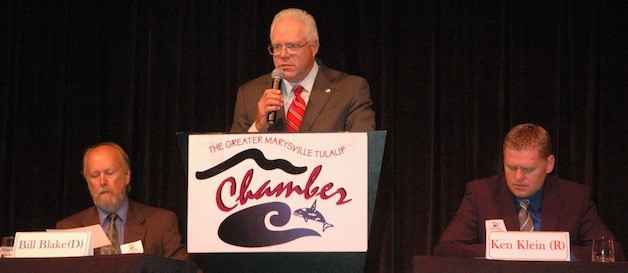TULALIP — City of Arlington Natural Resources Manager Bill Blake and Arlington City Council member Ken Klein remained complimentary and cordial to one another throughout the Snohomish County Council Candidates’ Forum hosted by the Greater Marysville Tulalip Chamber of Commerce on Friday, Aug. 23.
But even as the two men both touted their deep family roots in the local community, and echoed a few of each other’s opinions, some clear contrasts emerged between Blake, the Democrat who sees government as a servant of its citizens, and Klein, the Republican who believes that too much government interference can hinder citizens’ liberties.
While Blake advocated ensuring that the Growth Management Act holds developers accountable for funding new roads and new schools, Klein proposed far more sweeping reforms.
“Does it work?” Klein asked. “If it hasn’t worked, then it probably needs revising. If its problems are severe enough, it needs to be revoked.”
Klein argued that, rather than reducing sprawl, the increased price tag that he pointed to the GMA for affixing to urban homes has instead motivated more city-dwellers to move to rural areas and develop them. He also blamed the GMA for forcing smaller family farms out of business, while Blake invoked an example from further afield.
“In Europe, you see cities and farmlands right next to each other,” Blake said. “They’ve had hundreds of years to figure this out.”
On the topic of financial sustainability, Klein warned against what he sees as short-term thinking in government budgeting, one example of which he cited was a proposed tax increase to fund restoration of the Snohomish County Courthouse.
“We should be thinking ahead about how to maintain the assets we already have with the funds we already have,” Klein said. “If we’re creating a new asset, that’s another thing, but it’s irresponsible otherwise.”
While Blake acknowledged the value of a business-honed efficiency mindset in government, he also recalled how he’s had to remind municipal employees who have come from the private sector that government should not be a for-profit organization.
“Our job is to cover our costs,” Blake said. “At the same time, we should be spending less than we earn.”
Blake also sees fostering a diversity of regional businesses as key to the county’s financial sustainability, and even called for it to become “a full-circle economy, where we grow it, we harvest it, we process it and we serve it.”
On the subject of homelessness, Blake believes the two main factors are having a job and a place to live, to which end he again referred to Europe as a model for providing widespread public transport and locating places to live, work and shop in close proximity to one another. While Klein also identified affordable housing as an essential piece of the solution to homelessness, he defended the need of the free market to determine where such housing will be located, and praised churches and community service organizations for supplying “not just a hand-out, but a hand-up” toward self-sufficiency.
“Seventy-three percent of the role of county government is law and justice,” said Klein, who also deemed transportation infrastructure and public utilities among its primary priorities. “Its number-one role is to protect its citizens. Everything else is secondary. That doesn’t mean we shouldn’t do anything else, but rather, we should look for the best ways of doing it.”
“County government’s role is to serve the citizens of Snohomish County, but there are different levels of service,” Blake said. “Some are more local, like permitting and land uses, while others such as transportation really require coordination with the county. We get money for projects that other levels of government don’t get.”
Blake even commended John Koster — the term-limited outgoing Republican whose seat Blake and Klein are vying for — as an advocate for state and federal monies for smaller towns and cities in Snohomish County, while Klein highlighted the differences in philosophy between himself and Blake through their responses.
“He sees the opportunity of government to help people’s lives,” Klein said. “I think it’s more detrimental to the county right now, and should be removed as an impediment.”
Nonetheless, when the candidates were asked to describe their opponents’ greatest attributes, Klein lauded Blake’s professionalism and commitment to customer service while working for the city of Arlington as qualities that should be emulated by other government employees, just as Blake characterized Klein as a sincere and caring family man who wants what’s best for the community in which he and his loved ones live.
“He’s got me beat on the tall, handsome and good-looking part,” Blake chuckled, drawing laughter from the crowd.
Klein voiced his opposition to the state House’s proposed 10-cents-per-gallon gas tax to fund $8 billion in transportation projects, $400 million of which would be spent in Snohomish County alone, because he believes inefficiencies in that process need to be reformed before any revenues are raised without a vote of the people.
“When Arlington passed its Transportation Benefit District, it was different from the state proposing a mandate,” Klein said. “What we did was bring it before the people and ask them, ‘Do you want to pay for this?’”
Blake confessed to not being fully familiar with the issue, but opined that “I hate to spend more money than I have to, but there’s a lot of projects to pay for here.” He also expressed support for voter-supported methods of funding such projects on a more local level, as per the Arlington TBD, and even proposed funding for alternate forms of transportation to cars, including bikes and dirigibles.
“I agree with Ken that we should be spending less and having our engineers do more engineering,” Blake said.



